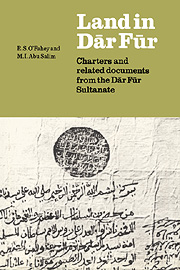Book contents
- Frontmatter
- Contents
- Preface and acknowledgements
- List and concordance of documents
- Transliteration and abbreviations
- Chapter 1 The Dār Fūr Sultanate
- Chapter 2 Estate and privilege
- Chapter 3 Literacy and Chancery
- Chapter 4 A Diplomatic Commentary
- Chapter 5 Translations and Commentary
- Sources and bibliography
- Notes
- Indices
Chapter 2 - Estate and privilege
Published online by Cambridge University Press: 16 November 2009
- Frontmatter
- Contents
- Preface and acknowledgements
- List and concordance of documents
- Transliteration and abbreviations
- Chapter 1 The Dār Fūr Sultanate
- Chapter 2 Estate and privilege
- Chapter 3 Literacy and Chancery
- Chapter 4 A Diplomatic Commentary
- Chapter 5 Translations and Commentary
- Sources and bibliography
- Notes
- Indices
Summary
The growth of the estate system
All the documents here arise, directly or indirectly, from grants made by the sultans of privileged status, landed estates or rights over people to chiefs, holy men, merchants and members of the royal family. The origins of this system and the possible external influences behind it are far from clear. The formulae found in the lawbooks and hearsay from Egypt and elsewhere no doubt helped to provide the legal framework, but local realities dictated the substance. However much garbed in Islamic dress, Dār Fūr “feudalism” was a local phenomenon that grew in step with the elaboration of the centralized state.
The sultanate grew from a tribal kingdom; as it subjugated or assimilated its neighbours beyond the Fur heartlands, the Fur chiefs were slowly transformed into courtiers and administrators. Expansion thus led to a physical concentration of men and resources around the ruler at the capital. In the eighteenth century the court or fāshir was mobile, feeding in turn upon different districts in the fertile west and south-west, but the establishment of al-Fāshir east of the mountains as a permanent capital at the end of the century made the need to mobilize resources more acute. The sort of precise bureaucratic allocation and management of resources possible and customary on the banks of the Nile was not feasible in the savannas. To provide for the burgeoning elite, it was necessary that they be able to exploit the countryside and its human resources, but extensively rather than intensively.
- Type
- Chapter
- Information
- Land in Dar FurCharters and Related Documents from the Dar Fur Sultanate, pp. 12 - 21Publisher: Cambridge University PressPrint publication year: 1983



